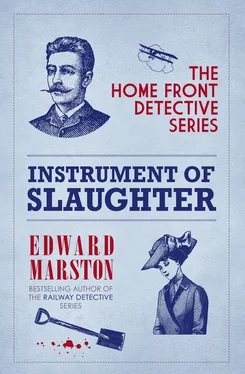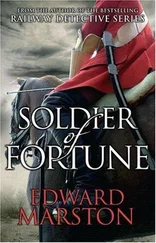Edward Marston - Instrument of Slaughter
Здесь есть возможность читать онлайн «Edward Marston - Instrument of Slaughter» весь текст электронной книги совершенно бесплатно (целиком полную версию без сокращений). В некоторых случаях можно слушать аудио, скачать через торрент в формате fb2 и присутствует краткое содержание. Жанр: Классический детектив, на английском языке. Описание произведения, (предисловие) а так же отзывы посетителей доступны на портале библиотеки ЛибКат.
- Название:Instrument of Slaughter
- Автор:
- Жанр:
- Год:неизвестен
- ISBN:нет данных
- Рейтинг книги:4 / 5. Голосов: 1
-
Избранное:Добавить в избранное
- Отзывы:
-
Ваша оценка:
- 80
- 1
- 2
- 3
- 4
- 5
Instrument of Slaughter: краткое содержание, описание и аннотация
Предлагаем к чтению аннотацию, описание, краткое содержание или предисловие (зависит от того, что написал сам автор книги «Instrument of Slaughter»). Если вы не нашли необходимую информацию о книге — напишите в комментариях, мы постараемся отыскать её.
Instrument of Slaughter — читать онлайн бесплатно полную книгу (весь текст) целиком
Ниже представлен текст книги, разбитый по страницам. Система сохранения места последней прочитанной страницы, позволяет с удобством читать онлайн бесплатно книгу «Instrument of Slaughter», без необходимости каждый раз заново искать на чём Вы остановились. Поставьте закладку, и сможете в любой момент перейти на страницу, на которой закончили чтение.
Интервал:
Закладка:
‘I thought they’d all be much the same as us,’ he said. ‘You know, ordinary lads with a bit of spunk in them. But some of these people look so … well, so damned respectable. I heard one man saying he was a bank manager, then there was that chemist we spoke to in the queue. I mean, they’ve got proper jobs.’
‘I’ve got a proper job as well,’ said Leach, tetchily. ‘I work in my father’s bakery. How is he going to manage if I get dragged off to war?’
‘You’re asking the wrong question.’
‘Am I?’
‘How is your father going to manage if you get dragged off to prison?’
Leach blenched. ‘Do you think it will come to that?’
‘It may do. And you agreed to stand firm with the rest of us.’
‘What about Ruby?’
Price sniggered. ‘I daresay you always stand firm with her.’
Leach’s blush turned his friend’s snigger into a guffaw.
The turnout was far larger than either of them had anticipated. Leach found the numbers overwhelming but Price was lifted by the thought that he wasn’t just an isolated dissident. He was part of a nationwide movement, albeit one that had a distinctly middle-class feeling to it in his eyes. There was no GWR cook like the Welshman on the platform, neither was there a baker’s assistant like Leach or a carpenter like Hambridge. Those about to address the assembly were well-dressed professional men with drooping moustaches and an air of propriety about them. Anyone less like potential lawbreakers was difficult to envisage, yet they were all going to preach the gospel of defiance. There were plenty of fur-collared coats and well-trimmed beards in the audience but there were also workmen in dungarees and skinny individuals in ill-fitting suits frayed at the edges. Lawyers rubbed shoulders with unkempt bricklayers and teachers sat beside those on whom education had had no visible effect. There was more than a smattering of women to offer moral support and gentlemen of the press were there to gloat, scorn, reinforce their prejudices or — in a few cases — treat the occasion with a degree of impartiality.
Leach was still thinking about Ruby Cosgrove when Price nudged him.
‘What’s a Muggletonian?’ he asked.
‘What?’
‘A Muggletonian. I overheard someone in the queue saying that he was here because he was a Muggletonian. What the hell is that?’
‘I haven’t a clue, Mansel.’
‘Maybe he went to some posh school called Muggleton.’
‘Be quiet,’ whispered Leach.
‘But I’m interested. I want to know .’
‘We’re about to start. Shut up, will you?’
As the chairman rose to speak, the heavy murmur slowly died out. Hambridge waited with something approaching trepidation. It was a paradox. Though he was a Quaker in quintessential Quaker habitat, he was cowed and ill at ease. Hating crowds, he sat hunched up in his seat, profoundly aware of his insignificance. Ablatt, however, was in his element, relaxed and comfortable, already composing in his mind the speech he intended to deliver when he got the opportunity. Nothing would have made the nervous, watchful Hambridge stand up in front of such a huge audience and, by the same token, nothing would deter his friend from doing so.
The chairman was Clifford Allen, a slight, alert, youngish man with a spiritual quality about him and a deep, measured voice that compelled respect.
‘Fellow citizens,’ he began, ‘let me welcome you all to what promises to be a crucial meeting of the No-Conscription Fellowship. You all know the position we take. Conscription is now law in this country of free traditions. Our hard-won liberties have been violated. Conscription means the desecration of principles that we have long held dear; it involves the subordination of civil liberties to military dictation; it imperils the freedom of individual conscience and establishes in our midst that militarism which menaces all social graces and divides the people of all nations.’
He looked around the sea of upturned faces. ‘We must offer determined resistance to all that is established by the Act.’
A ripple of applause greeted the declaration of intent. It built and built until it reached the proportions of a tidal wave. The chairman was pleased with the response. The meeting had started on a positive note.
An ovation which delighted those on the platform had a very different effect on those outside. When they heard the sustained clapping, they were enraged. The sound was like a red flag to a herd of bulls. Everyone wanted to break into the building but it was the sailors who acted on their behalf. Pushing their way to the front, they ignored the warnings from the police and clambered over the locked gates, earning cheers of encouragement from the crowd. When stewards tried to persuade them not to interrupt the meeting, they were pushed aside by the drunken sailors. Without quite knowing what they were going to do, the naval boarding party threw open the doors and stormed inside, set on causing some sort of commotion. But it never materialised. The sailors were so surprised with what they found that they came to a halt. The room was filled — it seemed to their blurred eyes — with quiet, pale-faced, mild-mannered men, several of whom were too thin, boyish and puny to offer any kind of fight. Instead of disturbing a group of rabid conchies, it was as if they’d stumbled into a church social. The shock took the wind out of their sails completely.
Nobody came to challenge them and there was no hint of danger. They were instead invited to stay and take part in the meeting. The sailors engaged in some good-humoured badinage and then, shepherded by the stewards, they withdrew in an orderly fashion, ridding themselves of a few valedictory jibes as they did so. Their attack had been effectively stifled. Physical confrontation had been averted.
The chairman was quick to seize on the cause of the interruption.
‘It was nice to see such genial visitors,’ he observed, dryly, ‘but it might be safer if we don’t provoke any more disruption. In future, when you approve of something that is said, don’t applaud. The crowd outside will hear you. Simply take out a handkerchief and wave it in approval. Do you all agree?’
Hundreds of handkerchiefs fluttered in the air. The suggestion met with unanimous endorsement. Whenever a speech delighted the audience, it was acclaimed in silence. Everyone on the platform said his piece, then it was the turn of people from the floor. Ablatt was among the first. Leaping to his feet, he caught the eye of the chairman and was given permission to speak. He made his way to the aisle so that he could turn to the audience before addressing it. It was as if he’d been waiting for this moment for years and he made the best of it.
‘Friends,’ he said with a sweeping gesture that took in the entire room, ‘I wish to offer my personal testimony. I am a devout Christian. I refuse to act as an instrument of slaughter …’
It was his favourite phrase and he’d used it ever since he first saw it in an article. Somehow he’d made the phrase his own. Price, Leach and Hambridge had heard him dozens of times but only in the close confines of a garden shed or a room in one of their houses. They’d never seen him in front of a large audience before and it was a revelation. Ablatt was a natural orator. His voice was clear, his argument coherent and his assurance remarkable. His speech had far more bite and sheer fervour than those of earlier speakers. The spectators were held spellbound by his eloquence. It made his friends proud of him and they lost any vestigial reservations they might have about defying the Military Service Act. While Ablatt was in full flow, Leach even managed to forget about Ruby Cosgrove.
The magic eventually wore off. By the time the meeting came to an end, Leach was full of apprehension again. He not only had to run the gauntlet of protesters outside, he had to face biting criticism from his fiancee and withstand Ablatt’s inevitable ire when he told him that he’d be unable to attend on the following day. Price had no such worries. He’d been roused by everything he’d seen and heard. Whatever the consequences, he was ready to withstand the power of the state. As the two of them came out with the rest of the crowd, they were met with jeers and ridicule but there was no longer any sense of menace. They stood aside to let others pass so that they could wait for their friends. In the event, Fred Hambridge came out alone.
Читать дальшеИнтервал:
Закладка:
Похожие книги на «Instrument of Slaughter»
Представляем Вашему вниманию похожие книги на «Instrument of Slaughter» списком для выбора. Мы отобрали схожую по названию и смыслу литературу в надежде предоставить читателям больше вариантов отыскать новые, интересные, ещё непрочитанные произведения.
Обсуждение, отзывы о книге «Instrument of Slaughter» и просто собственные мнения читателей. Оставьте ваши комментарии, напишите, что Вы думаете о произведении, его смысле или главных героях. Укажите что конкретно понравилось, а что нет, и почему Вы так считаете.












